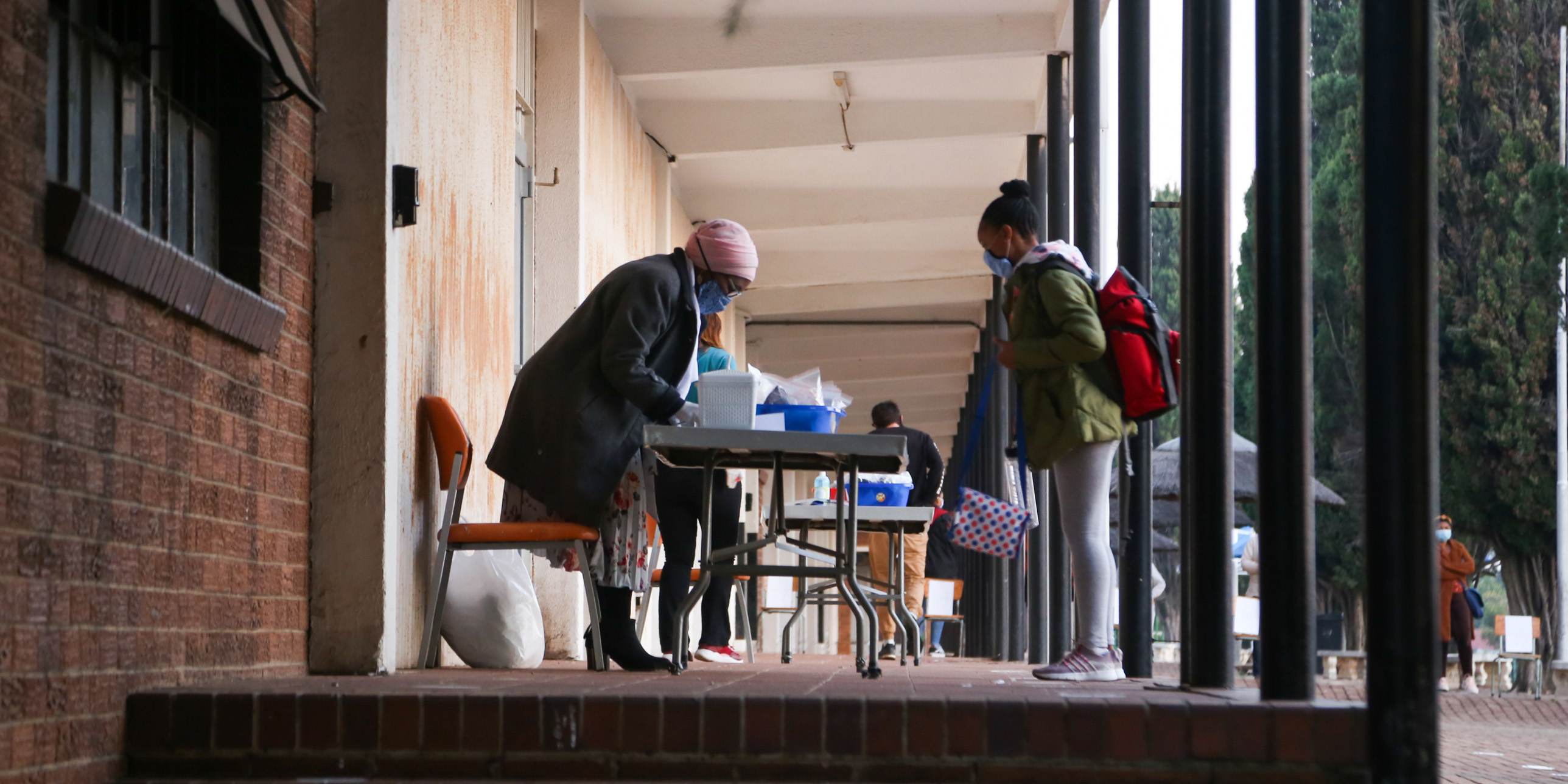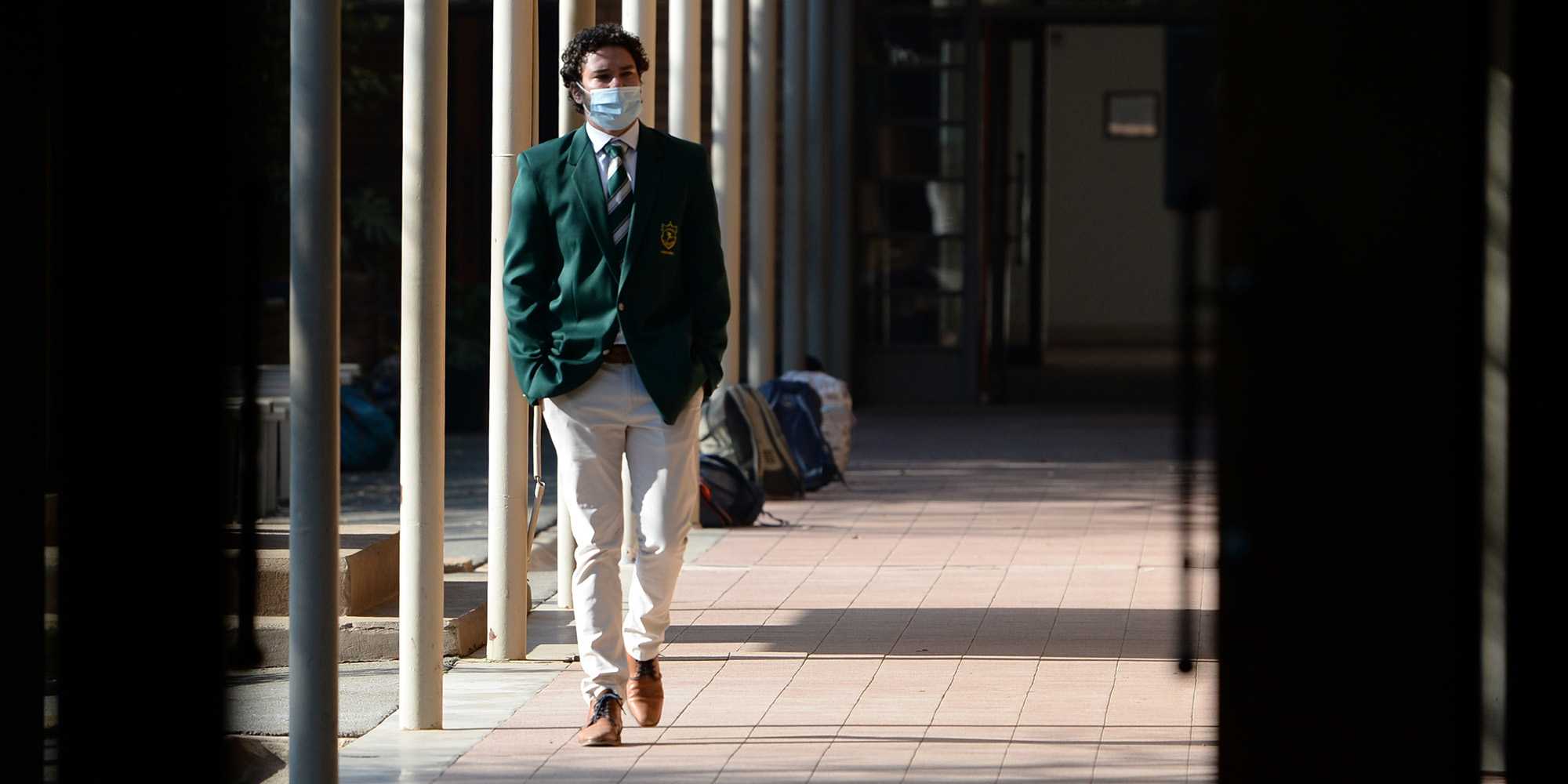A new paper from University of Stellenbosch education researchers argues that the cost to South African children who are being kept out of school far outweighs the risks of their return.
The research, undertaken by academics Servaas van der Berg and Nic Spaull, comes at a time when teachers’ unions are protesting and organisations, including Mmusi Maimane’s One SA Movement, are approaching the courts in an attempt to halt the staggered reopening of schools.
Van der Berg and Spaull analysed both the medical aspects of Covid-19 risk and the socio-economic costs of the school closures to reach their conclusions.
While they acknowledge that initial uncertainty about coronavirus made closing schools “the responsible thing to do” at the time, they contend that the information now available cannot justify the continued shuttering of education.
The researchers state that in terms of the current staggered reopening plans, Grade 7 and 12 pupils will have lost 25% of their normally scheduled school days by the end of the second term, and Grades 4, 5, 8 and 9 pupils will have missed 57% of regular daily schooling.
They point out that it is also possible that schools which reopen may yet be closed again.
“Given that South Africa has not yet reached its expected peak in terms of infections, and may well lock down again when it does reach the peak, it is unclear yet how long schools will remain open and whether they will close again when the peak does arrive,” they write.
Despite attempts made by some schools to allow for technology-adapted learning at home, and the government’s endeavour to provide Covid-19 learner support via TV and radio, significant losses in learning are likely to have occurred.
“Realistically, for the poorest 80% of learners in South Africa, virtually no curricular learning is taking place during lockdown,” the paper states.
Van Der Berg & Spaull 2020 Counting the Cost – COVID-19, Children and Schooling (15 June 2020)
This lack of mental stimulation is likely to have been exacerbated by 2019 Statistics SA figures cited in the study, which suggest that only 53% of childrens’ guardians in South Africa read books to them.
Adding to this the fact that children during the hard lockdown were not supposed to interact with peers or play outside, and taking into account recent international research showing that many children affected by school closures are at risk of “lasting psychological distress”, the authors conclude that the lockdown experience for large numbers of South African children has been “dire”.
“It is clear that ‘regular’ South African mortality risk in 2020 is far higher than Covid-19 mortality risk for all age ranges,” the researchers conclude.
Many will also have been in danger.
“Increased financial stress during economic recessions is also associated with increases in domestic violence,” the paper states.
“The added complications of the lockdown and permanent presence of children in the home increases the likelihood of children falling victim to such behaviour.”
While the lifting of the hard lockdown has meant that many workers can return to their employment, Van der Berg and Spaull write that one of the “most neglected” aspects of this situation has been the consequences of this while schools and crèches remain closed for most children. 2019 Quarterly Labour Force Survey figures show that 3,3 million South African children live in households where the only caregivers are employed adults.
“Even if there were 30% job losses [as a result of the lockdown’s economic fallout] there would still be 1,8 million children aged 18 or below that would be left home alone because their only caregivers would be at work,” the authors write.

Pupils comply with Covid-19 safety measures before entering their classroom at Rev. A Mapheto Primary School in Tembisa, Gauteng on 08 June 2020. (Photo: GCIS/Elmond Jiyane)
But while few people dispute the lockdown has been hard on kids, and that the loss of classroom time may have severe knock-on effects, the current school opening debate centres on the issue of medical risk and the safety of children and teachers.
In a court challenge filed by former DA leader Mmusi Maimane, for instance, he accuses the Department of Basic Education of trying to save the academic year “at any human cost or price”.
Maimane continues: “Our approach is that, much as the academic year must be saved, if possible, it is more important to save lives – even, if need be, at the expense of the academic year.”
His affidavit points to the realities of school overcrowding, sanitation problems, public transport and a likely lack of protective equipment as being factors which would endanger children and teachers.
With the return to school of Grade 7 and 12 learners on 8 June, there have been reports countrywide of schools already having to temporarily close for cleaning due to Covid-19 cases.
Unions have reacted with outrage, with the Educators Union of South Africa (EUSA) releasing a statement on Monday 15 June claiming that over 2,000 students and teachers have tested positive for coronavirus since the return to school.
But these figures should be treated with caution, as it is unclear how many of these cases were contracted prior to schools re-opening.
In the Western Cape, for instance, provincial authorities stated in a recent briefing that although almost 1,800 children in the province had tested positive, 1,537 cases were reported before the return to school.
It is too early to say whether the reopening of schools has caused a spike in infections that would not otherwise have occurred – though the South African Paediatric Association (Sapa) predicted that an increased risk of infection for kids was “certain”.
Yet despite this, Sapa has taken the position that children should return to school immediately because of the generally mild disease course of Covid-19 for kids, and the evidence from international studies that teachers are more likely to contract the virus from other adults than from children.
The Stellenbosch researchers have used projections of total South African Covid-19 deaths amounting to 48,000 in order to estimate the mortality risk posed by the disease to children and teachers.
They calculate that the risk of dying from Covid-19 for a South African 0-19 year-old this year is around 1 in 76,876.
By contrast, the same age group’s “regular” annual mortality risk – in other words, how likely they are to die in an average year of causes unrelated to Covid-19 – is 1 in 1,000, based on 2016 mortality figures.
Even for adult teachers, who are much more likely than children to suffer a severe Covid-19 disease course, the researchers argue that the risk of dying from Covid-19 is still much lower than their chances of dying under “normal” circumstances.
“It is clear that ‘regular’ South African mortality risk in 2020 is far higher than Covid-19 mortality risk for all age ranges,” the researchers conclude.
“We argue that the relatively low mortality risk from Covid-19 needs to be contrasted to the significant additional mortality risk from acute malnutrition and associated mortality in children (especially pneumonia, diarrhoea and HIV/AIDS) arising from the lockdown.”
Given the low risk, Van der Berg and Spaull further suggest that it is pointless to require local schools to enforce physical distancing within classrooms.
“Reviewing the data on class sizes in South Africa, in conjunction with government regulations and the spatial realities of South African classrooms, it is clear that at least half of South African learners will not be able to practice physical distancing within a classroom,” they write.

A teacher at Hoerskool Linden during the reopening of schools following lockdown due to Covid-19. (Photo: Gallo Images/ Felix Dlangamandla)
“Furthermore, teaching outdoors is problematic, since South Africa is now in the winter season. This is apart from the fact that teaching 50+ learners in an open space is practically very difficult even without weather considerations.”
The authors do, however, endorse mask-wearing for older children and physical distancing on the playground.
They argue not just that schools should be re-opened immediately, but also that government should refrain from closing schools nationally again in future, no matter the surge in Covid-19 cases.
“Millions of South African children’s education and mental health have been compromised in this initial period of uncertainty. Given what is now known about the mortality rates of Covid-19, we believe that the ongoing disruptions to children’s care, education and health are no longer justified,” Van der Berg and Spaull conclude. DM






 Become an Insider
Become an Insider